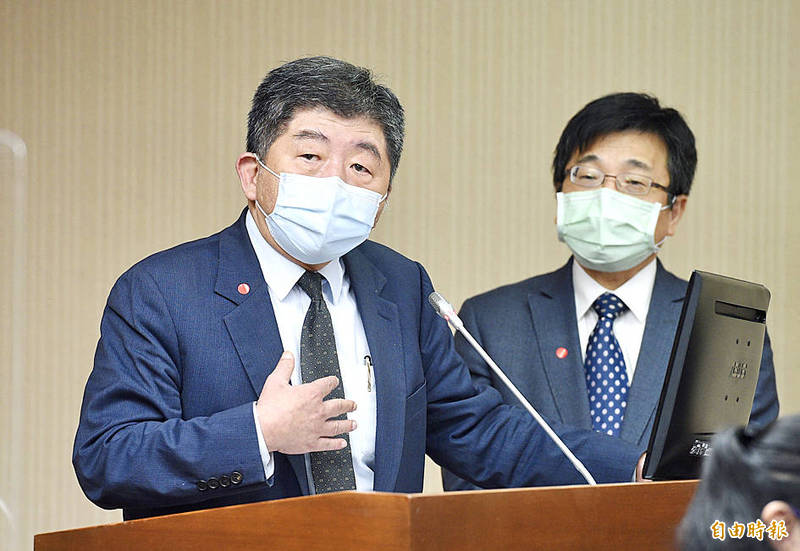《TAIPEI TIMES》 Digital immunization certificate touted

Minister of Health and Welfare Chen Shih-chung, left, and Centers for Disease Control Director-General Chou Jih-haw answer questions from lawmakers at a meeting of the legislature’s Social Welfare and Environmental Hygiene Committee in Taipei yesterday. Photo: Peter Lo, Taipei Times
BILATERAL CERTIFICATION: The government would need to ensure that other nations could identify an authentic Taiwanese certificate, Chen Shih-chung said
By Shelley Shan / Staff reporter
Taiwan is to introduce a digital COVID-19 immunization certificate that would be similar to the EU’s immunization passport, Minister of Health and Welfare Chen Shih-chung (陳時中) told a meeting of the legislature’s Social Welfare and Environmental Hygiene Committee yesterday.
Democratic Progressive Party Legislator Lai Hui-yuan (賴惠員) asked Chen about a COVID-19 immunization certificate as 70 percent of the population is expected to receive at least the first dose of a vaccine by the end of this month.
“We have completed the planning for a digital immunization certificate, which is modeled on that created by the European Union. We will ask the Ministry of Foreign Affairs to assist in matters related to bilateral certification of immunization documents between Taiwan and other nations,” Chen said.
Several issues need to be addressed before the government launches the immunization certificate, he said.
“We have to ensure that other nations can identify an authentic and valid Taiwanese immunization certificate and vice versa. We must also ascertain which vaccine brands are accepted by other nations,” he added.
Vaccines that have secured emergency use authorization from the Food and Drug Administration or emergency use listing at the WHO would be taken into consideration, unless there is substantial evidence showing that a vaccine cannot adequately protect people from contracting the disease, Chen said.
The health ministry would also scrutinize if any vaccines have a high breakthrough infection rate, he said.
The WHO has listed emergency use vaccines manufactured by Moderna, AstraZeneca and Pfizer-BioNTech, as well as those produced by Chinese firms Sinopharm and Sinovac.
Chinese Nationalist Party (KMT) Legislator Yeh Yu-lan (葉毓蘭) asked Chen for a time line for the government to gradually reopen the nation’s borders, given that many other nations have adopted policies to coexist with COVID-19.
The government would only consider reopening borders when at least 70 percent of the population has received a first dose of a vaccine and 60 percent have received two doses, as this is the way to protect against an outbreak of COVID-19, Chen said.
“We will not have enough capacity to handle COVID-19 patients if the borders are completely opened. As such, we must manage people arriving in the nation based on the health risks they pose to the local community, which would depend on the vaccine they have received and the state of the pandemic in the nation they have arrived from,” he said.
Chen also dismissed the possibility of allowing people to quarantine at home.
Of the 110,000 people who had entered Taiwan since August, 176 had tested positive for COVID-19, of which 136 were breakthrough infections, he added.
“Although they had mild symptoms, there is no guarantee that people who contract COVID-19 from them would also experience mild symptoms,” Chen said.
Since June 27, Taiwan has required all arrivals to quarantine for 14 days either at a designated hotel or government center.
Previously, arrivals were able to choose to quarantine at home if they lived alone or if everyone else who lived there was also in quarantine.
The stricter quarantine requirements were a response to the global spread of the more infectious Delta variant of SARS-CoV-2.
Additional reporting by CNA
新聞來源:TAIPEI TIMES













